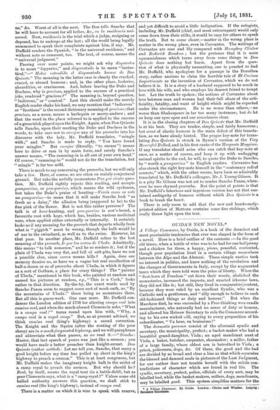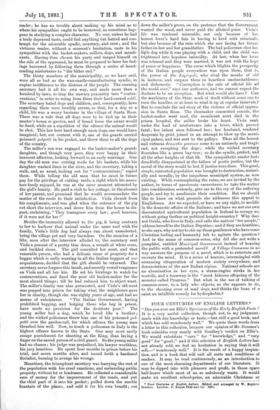OUIDA'S NEW NOVEL.*
A Village Commune, by Ouida, is a book of the dreariest and most pessimistic tendencies that ever was shaped in the form of
a novel. Here is a brief outline of the contents :—In the good old times, when a bottle of wine was to be had for one halfpenny and a chicken for three, a happy, pious, peaceful, contented, though poor population lived in a certain village somewhere between the Alps and the Abruzzi. These simple rustics took no interest in politics, and knew nothing of the revolution and the changes of Governments in Italy, except by the augmented taxes which they were told were the price of liberty. When the "first-born of Freedom" cut down their woods, abolished the monasteries, increased the imposts, and enacted irksome laws, they did not like it; but still, they lived in comparative:content, because they were ruled by an excellent Syndic, who was a Catholic and a gentleman, and "silly enough to believe in such old-fashioned things as duty and honour." But when the Marchese died, he was succeeded by a Free-thinking wax-candle manufacturer, who naturally had no sense of duty or honour, and allowed his Hebrew Secretary to rule the Commune accord- ing to his own wicked will, saying to every proposition of his subordinates, " Va bene, va benissimo !"
The dramatis personce consist of the aforesaid syndic and secretary, the municipality, prefect; a basket-maker who had a beautiful grand-daughter, Viola ; an aged mendicant aunt of Viola, a baker, butcher, carpenter, shoemaker ; a miller, father of a large family, whose eldest son is betrothed to Viola ; a priest, policemen, dogs, &c. Of these, the good and the bad are divided by as broad and clear a line as that which separates the blessed and damned souls in pictures of the Last Judgment, for our author does not trouble herself with the subtle con- tradictions of character which are found in real life. The syndic, secretary, prefect, police, officials of every sort, may be labelled bad, while the basket-makers, millers, dogs, mendicants, may be labelled good. This system simplifies matters for the * A Village Commune. By Ouida. London: Chatto and Windas. Leipzig : Barnhart Tauelmitz.
reader; he has no trouble about making up his mind as to where his sympathies ought to be bestowed, as sometimes hap- pens in studying a complex character. No one, unless he had a truly depraved taste, could feel anything but hatred and con- tempt for the miserable syndic, secretary, and crew ; and the virtuous reader, without a moment's hesitation, casts in his sympathies with the basket-makers, millers, dogs, and mendi- cants. Having thus chosen his party and ranged himself on the side of the oppressed, he must be prepared to have his feel- ings harrowed by following them through a series of heart- rending misfortunes to "the bitter end."
The thirty members of the municipality, as we have said, were all as bad as the wax-candle-manufacturing syndic, in supine indifference to the distress of the people. The cunning secretary had it all his own way, and made more than a hundred by-laws, to trap the unwary peasantry into " contra- ventions," in order to wring from them their hard-earned soldi. The secretary hated dogs and children, and, consequently, laws regarding them were terribly severe, so that, for a dog or a child, life was a weary business in the village of Santa Rosa. There was a rule that all dogs were to be tied up in their master's house or garden, and if found loose the owner would be fined, while on a repetition of the offence the animal would be shot. This law bore hard enough upon dogs, one would have imagined; but, not content with it, one of the guards carried poisoned polpetti in his pocket, and threw them to all the dogs of the country.
The miller's son was engaged to the basket-maker's grand- daughter, and though very poor, they were happy in their innocent affection, looking forward to an early marriage. One day the old man was cutting reeds for his baskets, while his daughter washed linen in the river, and the secretary, taking a walk, and, as usual, looking out for "contraventions," espied them. While telling the old man that he must in future pay for the privilege of cutting reeds, a right which his ances- tors freely enjoyed, he was at the same moment attracted by the girl's beauty. He paid a visit to her cottage, in the absence of her parent, and promised that he would accommodate the matter of the reeds to their satisfaction. Viola shrank from his compliments, and was glad when the entrance of the pig cut short the interview, and drove him from the house in dis- gust, exclaiming, "They transgress every law ; good heavens, if it were not for her !"
Resides the immunity allowed to the pig, it being contrary to law to harbour that animal under the same roof with the family, Viola's little dog had always run about unmolested, being the village pet and very harmless. On the occasion of a fête, soon after the interview alluded to, the secretary sent Viola a present of a pretty blue dress, a wreath of white roses, and buckled shoes. The girl consulted her aunt, and that venerable person, who had a delicate sense of propriety for a beggar which is sadly wanting in all the Italian beggars of our acquaintance, decided that the gift should be returned. The secretary never forgave this insult, and secretly vowed vengeance on Viola and all her kin. He set his hirelings to watch for contraventions, and fined the poor old basket-maker for the most absurd things ; till he had reduced him to abject want. The miller's family was also persecuted, and Viola's old aunt was popped into prison for taking what the neighbours gave her in charity, though she was eighty years of age, and had no
means of subsistence. "The Italian Government, having prohibited begging, and lodging those who beg in prison, have made no provision for the destitute poor." The young miller had a dog, which *he loved like a brother ; and the wicked policeman threw him one of his poisoned pot- petti over the garden-rail, for which offence the young man thrashed him well. Now, to touch a policeman in Italy is the highest offence known to the State. One may more easily escape punishment for shooting at the King, than laying a finger on the sacred person of a civil guard. So the young miller had no chance; his judge was prejudiced, his lawyer worthless, his jury heartless. He spent four months in prison before his trial, and seven months after, and issued forth a hardened Socialist, burning to avenge his wrongs.
Meantime, the triumphant secretary was harrying the rest of the population with his cruel exactions, and embezzling public property, without let or hindrance. He collected a, considerable sum of money for the improvement of the roads, and put the chief part of it into his pocket ; pulled down the marble fountain of the piazza, and sold it for his own benefit; cut down the miller's grove, on the pretence that the Government wanted the wood, and never paid the allotted price. Viola's life was rendered miserable, not only because of her honest lover's hard fate in having to herd with criminals,. but also because of the ruin which she saw facing her future
father-in-law and her grandfather. The bad policeman shot her little dog while it was playing with a child, and the child was frightened into hopeless imbecility. At last, when her lover was released and they were married, it was not with the hope of peace or happiness. The curse which blights the prosperity of the Italian people everywhere was upon them, that is, the power of the Impiegati, who rival the monks of old in laziness, and surpass them in heartless uncharitableness and dishonesty. "Corruption is the rule of official life all the world over," says our authoress, and we cannot expect the- Italians to be an exception. But what would she have ? Can the machinery of the State work of itself without some one to. turn the handles, or at least to wind it up at regular intervals ?- But to conclude the sad story of the victims of official oppres- sion in Santa Rosa. The shoemaker committed suicide, the basket-maker went mad, the mendicant aunt died in the prison hospital, the miller broke his heart. Viola sank under the load of misfortunes into a fever, which proved. fatal ; her infant soon followed her ; her husband, rendered desperate by grief, joined in an attempt to blow up the muni- cipal palace, and was sent to the galleys. Thus all the honest and virtuous dramatis PCITO)103 come to an untimely and tragic end, not excepting the dogs ; while the wicked secretary flourishes like a green bay-tree ; so do the syndic, prefect, and all the other knights of that ilk. The sympathetic reader feels dreadfully disappointed at the failure of poetic justice, but the moral of the story would be lost if justice were done. This good,. simple, contented population was brought to destruction, materi- ally and morally, by the iniquitous municipal system, as now existing. While contemplating the ruins, we are invited by the author, in terms of passionate earnestness, to take the matter into consideration seriously, give ear to the cry of the suffering people, and try to ameliorate their condition. But we should like to know on what grounds she addresses this appeal to Englishmen. Are we expected, or have we any right, to meddle- in the domestic affairs of the Italians ; and have we not our own discontented agricultural population in Ireland to occupy us,. without going farther on political knight-errantry Why does not Ouida, who lives in Italy, and calls the natives " her peepler address herself to the Italian Deputies ; and if they are heartless,. as she says, why not try to stir up those gentlemen who have some Christian feeling and humanity left to agitate the question ? And in the name of common-sense, why did she not write a pamphlet, entitled Municipal Government, instead of hoaxing the public with a pretended novel ? A Village Commune in no- way answers the purpose of a novel, which is to entertain and recreate the mind. It is a series of horrors, intermingled with screaming vituperation of modern society everywhere, and denunciations of the new Italian regime. National schools are an abomination in her eyes, a steam-engine stinks in her nostrils, and a tramway is the "most hideous offspring of the monster called Progress." But what is the use of talking of common-sense, to a lady who objects, as she appears to do,. to the shooting even of mad dogs, and thinks the bone of a saint an infallible remedy for hydrophobia ?



































 Previous page
Previous page